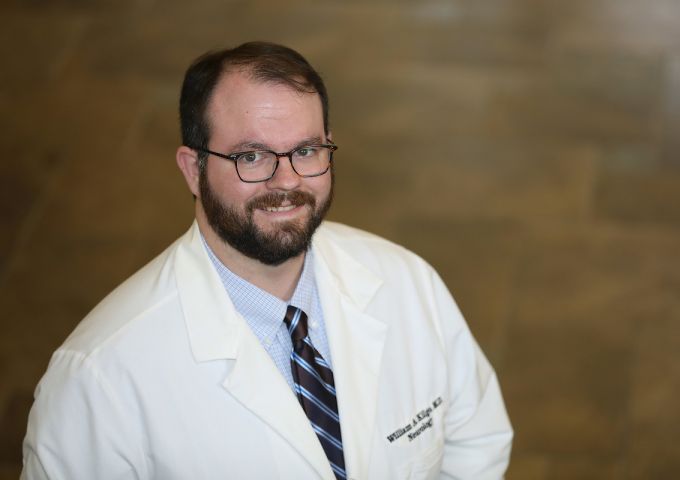
USA awarded $1.43 million, selected as clinical site for dementia study
The Diverse VCID study uses advanced brain imaging and blood-based techniques to understand how vascular changes in late life cause brain injury that can lead to cognitive decline.
By Lindsay Hughes
[email protected]
The University of South Alabama has been selected as a clinical site for a national research study on Alzheimer’s disease and other dementias — Diverse Vascular Contributions to Cognitive Impairment and Dementia, or Diverse VCID.
The National Institute of Neurological Disorders and Stroke (NINDS), part of the National Institutes of Health, has commissioned a scientific team to design and implement a six-year study of 2,250 Americans from diverse backgrounds in order to understand the role that cerebrovascular disease plays in developing dementia. UC Davis Health, along with UTHealth Houston, is leading the study.
USA was awarded $1.43 million in funding over a four-year period to serve as a clinical site for the Diverse VCID study. The award is part of a $53.6 million grant from the NINDS to UC Davis.
Amy R. Nelson, Ph.D., assistant professor of physiology and cell biology at the Whiddon College of Medicine, is principal investigator of the subcontracted research at the University of South Alabama. Nelson has led the establishment of the Gulf Coast Alzheimer's Disease Research Center at USA.
“Alzheimer’s disease and related dementias are truly devastating for patients and their caregivers,” Nelson said. “Alabama has the third-highest mortality rate due to Alzheimer’s disease in the country. The disease is becoming more prevalent because our aging population is growing, with an estimated 12.7 million Americans predicted to face this disease by 2050 if new medical breakthroughs to prevent or cure the disease are not discovered.”
“Black and Hispanic individuals have a higher prevalence of both vascular diseases and Alzheimer’s disease,” she added. “Our goal is to understand the links between damage to blood vessels in the brain and memory loss in our local diverse community.”
The Diverse VCID study uses advanced brain imaging and blood-based techniques to understand how vascular changes in late life cause brain injury that can lead to cognitive decline. This study will examine the impact of white-matter injury on cognitive performance among a diverse population. The researchers are recruiting participants between the ages of 65 and 90 who have noticed changes in their memory or thinking but have not been diagnosed with dementia or experienced a stroke.
As part of the study, participants will visit the research center site two to three times a year for three years, review their medical history and current care plan, complete a questionnaire, and receive a medical examination, brain MRI and blood draw. The MRI and testing will be performed at University Hospital and the Strada Patient Care Center. Participants will help researchers create a risk “scorecard” with data from brain scans, genetics and other key biomarkers.
“We may have insights that indicate a person’s risks are very low. Or maybe the person’s risks are very high, but there are contributing factors like diabetes or hypertension that we can address,” said Charles DeCarli, M.D., principal investigator for the study. DeCarli is a professor of neurology and the director of the UC Davis Alzheimer’s Disease Research Center. “We hope that having a risk profile will allow us to modify the risk and potentially prevent or delay the disease.”
“I am grateful and excited to have been selected as a clinical research site for this incredibly important study. I am also proud to have founded the Gulf Coast Alzheimer’s Disease Center,” said Nelson, who noted that these endeavors would not be possible without the support of DeCarli at UC Davis, along with administrators, faculty and staff at USA and USA Health. “We now also need the support of our community members of the Gulf Coast Alzheimer’s Disease Research Center, and to help to spread the word about this research study. If eligible, we encourage and welcome you to volunteer to participate in this study. Together we can begin to unravel this cruel disease and fight for a world without Alzheimer’s.”
In addition to Nelson, multiple faculty, staff and students at USA and USA Health are involved in the project: Hanna T. Czarkowska, M.D., assistant professor of neurology; Brett S. Martin, M.D., assistant professor of radiology; Donald Robinson, radiology technologist; Benjamin D. Hill, Ph.D., professor of psychology; Allison Bauman, research technologist and lab manager; Yelitza Rodriguez, Ph.D., and Erica Sutherland, clinical trials staff; and psychology Ph.D. students.
Establishment of the study at USA was supported by Troy Stevens, Ph.D., professor and chair of physiology and cell biology; Suzy Figarola, M.D., professor and chair of radiology; and Michael Chang, M.D., chief medical officer for USA Health.
To learn more about the study, visit diversevcid.ucdavis.edu. To participate, call 251-460-6834 or email [email protected].




